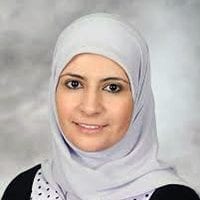Putting Passion into Practice
Diagnosing and treating infectious diseases (IDs) is sometimes “a detective job,” says Dr. Rania Saleh, Tele-ID specialist with Eagle Telemedicine. “It’s always challenging. Each patient case is different.”
Working as a consultant with two traditional hospitals and five small critical access hospitals in the north central region of a large Wisconsin health system that has partnered with Eagle for Tele-ID services, Dr. Saleh puts her detective skills to work. In a typical month she diagnoses and treats such infections as pneumonia, cellulitis and the bone infection osteomyelitis.
In the heavily wooded area of Wisconsin where the hospitals are located, Lyme disease and the fungal disease blastomycosis are endemic, so she frequently treats patients with those infections, too.
“I spend as much time as I can with patients,” she says. “It’s easy to miss things when forming a diagnosis, and I ask many questions to get the information I need. Usually a consult can go from 15 to 30 minutes.” She also depends on lab results and cultures to give her the clues she needs, as well as consulting with the patient’s own physician.
She had an interest in medicine at an early age. And her gift for being able to talk with patients—especially to communicate with them via the videoconferencing monitor used in telemedicine—springs from a simple philosophy.
“Achieving a doctorate degree was a journey of hard work,” she says. “But I understand that being a patient is much harder. For that reason, I endeavor to treat all my patients as if they were a member of my family.”
That commitment to patients produces results. Patients suffering from infections are now more likely to stay in their hometown hospital with Dr. Saleh there to manage the supervised dosing of antibiotics for complicated infections and other care required by ID patients. For example, one of the hospitals had been transferring 50% of its patients needing ID consultation to distant hospitals out of network. Through the Tele-ID program, it has reduced that number to virtually zero.
She completed medical school at Al-Quds University in Jerusalem, where she was one of the top 10 graduates, and, after her move from Palestine to the U.S. in 2006, she did her residency in internal medicine at Advocate Christ Medical Center in Oak Lawn, Ill. After completing her residency, Dr. Saleh worked as an onsite hospitalist in the Chicago area. In 2015, when she completed a fellowship in infectious diseases at Rosalind Franklin University of Medicine and Health Sciences, she heard that Eagle was providing specialized care to hospitals through telemedicine.
It was the career shift she’d been looking for. Driving sometimes three hours a day to get to her hospital jobs, she found the concept of telemedicine an attractive one. “I knew not commuting would make a big difference in my life,” said Dr. Saleh, especially since she and her husband, Senan, had young children at home. So, she talked with Dr. Talbot “Mac” McCormick, Eagle’s President and CEO, about working as a Tele-ID consultant from her home in the Chicago area.
“He said, if you bear with me, I will get you a contract, and one year later, in December 2018, he did.” That’s when she began working as a consultant with the Wisconsin hospitals.
Now, as the mother of two sets of twins, ages 9 and 2, she finds the work an ideal fit. “Since it’s consulting work and not shift work, I’m not tied to certain times. Some days I might have zero consults, some days I might have three or four.”
Was it difficult to make the transition from bedside inpatient work to telemedicine consulting? “When I started everything was new to me and to the clinical staffs at the hospitals, so it took some getting used to, but it’s easy now, and the nurses are very adept at operating the system and working with me as we interact with patients. I’m not able to touch the patient’s infection, of course, so the nurse must perform that task for me. It works very well.”
Patients like it, too. “Most patients get excited about the technology. The few who have had a problem with it would have been difficult patients regardless. That’s just part of life in the real world.”
In addition to consulting with patients, she says that physicians working at the hospitals sometimes consult with her when they have patients with infections. “We had a patient with fever and elevated white blood count and the doctors couldn’t pinpoint the cause. We did additional testing and it turned out to be cancer. Fungal infections can also be difficult to diagnose.”
Another physician calls her regularly to confirm which IV antibiotic to prescribe for a patient and whether the amounts need to be adjusted. “He just wants to make sure his decision is OK,” she says.
The hospitals are happy, too. “They are pleased with the Tele-ID services because we are prompt. There are no longer any issues with local specialists being too busy to respond in a timely fashion. They have come to trust us and the work we do, and that is very fulfilling.”
